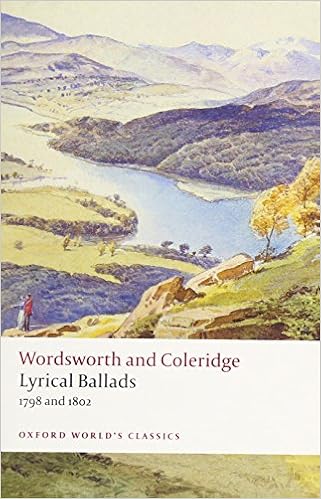
Lyrical Ballads by William Wordsworth and ST Coleridge, edited by Fiona Stafford – review
It may be the scourge of students, but a collection that deserves to be thought of as poetry's punk moment is pure pleasure second time round
Having had a child recently go through A-level English, my own memories of that time were reactivated. I once again came to the conclusion that the exam is specifically designed to eradicate all love and passion for the subject. If you still like literature after going through that, then you must really like it.
I thought about my student days as I removed this book from its Jiffy bag. Oh my God, I thought, here it is again. I remember trying to think – this is more a university memory than an A-level memory, but the principle is the same – of something to say about Lyrical Ballads that hadn't been said a hundred thousand times before, and being utterly confident that I wouldn't be able to do so.
And yet – there must be some suitably Wordsworthian lines to describe this phenomenon – sometimes, when something comes round a second time, it can be a source of pleasure and comfort, rather than the occasion for bewilderment and terror it first was. Now I can enjoy these poems for what they are, without having to worry what to say about them. In fact, to show how far I've moved on, I'm writing about them of my own free will (and for money, of course. That always helps).
Lyrical Ballads, in case you missed it, is, quite simply, possibly the single most important collection of poems in English ever published. It came out in two editions, one of 1798 and one of 1802, the large majority of the poems in each written by Wordsworth. There are enough differences of content between the two editions for them to be usually published, along with the critical apparatus, in one volume, one after the other. The 1798 edition has a short "advertisement" as an introduction, warning readers that the poems within "were written chiefly with a view to ascertain how far the language of conversation in the middle and lower classes of society is adapted to the purposes of poetic pleasure". In other words, the high-falutin' poetic diction of the 18th century was renounced; plain speech, with as many monosyllables as possible, took its place, and nothing was ever the same again. Its effects are still with us, remarkably. The 1802 edition, much longer, also has a longer Preface, which amounts to a manifesto for what came to be known as Romanticism in particular; and poetry in general.
You could – although I wouldn't recommend saying this out loud if you're a student – think of 1798 as poetry's punk moment. For not only was the language changed, so was the subject matter. There were no more gods or allegories or royalty: here you had vagrants, beggars, convicts, idiots, the mad, wretches and outcasts. This was considered virtually revolutionary; as Professor Stafford tells us in her excellent introduction, one critic went so far as to say that the poem "Goody Blake and Harry Gill" – in which a farmer who catches a woman gathering scrubwood from his land for fuel is cursed never to feel warm again – threatens "real anarchy". In a world still digesting the events of the French revolution, writing verse on such subjects could itself be seen as an insurrectionary act. (The poem of Goody Blake is, incidentally, the only one Wordsworth said came from a true story.)
Otherwise, you will find that this volume is, like Hamlet, full of quotes. I can't think of another poetry collection with an introduction that supplies any lines remotely as familiar as "emotion recollected in tranquility". Plus, you also have the whole of "The Rime of the Ancyent Marinere" (1798) – or, if you prefer, "The Ancient Mariner" (1802). And if some lines therein are unfamiliar – "A fire was once within my brain, / And in my head a dull, dull, pain; / And fiendish faces, one, two, three, / Hung at my breasts and pulled at me" – you'll find they stay with you. As do – admittedly, for different reasons – the lines from "The Thorn", "I've measured it from side to side: / 'Tis three feet long, and two feet wide". But then, all bold ventures risk mockery at some point.
No comments:
Post a Comment